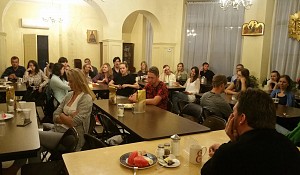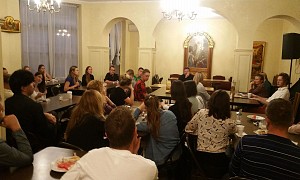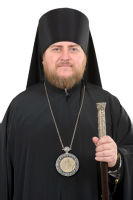On Tuesday, July 25, the weekly meeting of Orthodox Youth was held in the refectory of St. Nicholas Cathedral in New York City. The speaker for the evening’s meeting was the Administrator of the Patriarchal Parishes in the USA, His Grace John, Bishop of Naro-Fominsk. His Grace proposed speaking with the youth about his thoughts on the role of the internet in the life of an Orthodox Christian.
To begin, Bishop John briefly shared some of his own observations. He believes that active participation in internet discussions (when time spent on social media prevails over live communication), the notion of the “here and now” – something extremely important for a Christian – is threatened.
Bishop John drew the attention of the young people [to the fact] that the life of the Church was founded on the basis of the parish community. People would gather together to pray, commune from one common Chalice, and then interact with one another during fellowship. It would seem that a more individualized model of communication, where one could meet with a so-called “priest-psychoanalyst,” would be more effective. One would be able to make an appointment and be able to resolve spiritual and moral problems one-on-one. Why, then, would it be necessary to gather and pray together?
Vladyka reminded [his audience] that the first Christian churches (much like the modern parish) were established on the basis that the Church is a hospital where all can come to recover. Thus, those who came to the Church were all united in their desire to be healed. We are not saints, but rather a group of penitent sinners. This is why when we come to a hospital and our leg hurts, we do not desire to point with our fingers at someone who is deaf or blind sitting near us with a more serious illness than ourselves. This is something that doesn’t concern us.
“I was recently at a meeting for Alcoholics Anonymous and witnessed the many takeaways from the Church,” said Vladyka John. “A person comes and exclaims that ‘I am an alcoholic.’ He is not proud of this, but upon recognizing his own weaknesses, he begins the path to recovery. Moreover, those who participate in these meetings do not identify themselves as healed until the end, once they understand the need for God’s help, as well as the daily struggle to better oneself.”
At the same time, internet communication offers “too broad of a forum.” Someone on the internet can feel the desire to “save the world,” while at the same losing sight of his own illness and the needs of his mother, friend, neighbor, the homeless – who are all near at hand. There are times where we read about problems or conflicts in churches on the other end of the Earth and get so consumed by the ensuing internet discussion that we do not notice those suffering next to us.
Ideally, there should be live interaction in the parish. Members of the parish community are called to bear one another's burdens (Galatians 6:2). It may very well be that a person may be uncomfortable sharing his problems with others. However, this depends on the rector and the atmosphere he creates within the parish. And so, if a person feels disconnected in their own parish, this is well within their right, but it also means that something in the system is not working.
After expressing his own thoughts, Bishop John opened the floor to those present. One attendee stated that, thanks to modern technology, anyone is able to view the service schedule and read spiritual literature from a smartphone, and this is undoubtedly good. At the same time, the internet provides an opportunity for a person to make harsh statements under an alias without the need to answer for his actions. Someone noted that social media users attempt to present themselves insincerely in a more positive light… This in turn leads people to depression, because they try to compare themselves to these “picture perfect” individuals (those who boast about a tidy apartment, smiling children, a photograph in an evening dress or relaxing on the beach) and are unable to do so. Someone else mentioned that the internet allows someone with an urgent spiritual question to get an answer if the priest from the local parish is unavailable.
The discussion surrounding interaction on the internet resulted in related topics arising. A participant asked, “Is information the same as knowledge, and if not, what is the difference?” Vladyka answered after some reflection, saying, “Information is an abstract set of facts, while knowledge is inseparable from our lives.” For example, palms grow in the south; this is information. What it has to do with me, though, is unclear.” However, concepts such as love, friendship, and mutual assistance, which we regularly practice, is knowledge. “Unfortunately, a person can have an immense amount of information on the Bible, the divine services…, and at this level, all of that is just information, unless it is implemented. But a person is capable of making true and interesting judgments on the subject matter…," Bishop John sighed.
In the audience, someone asked “Vladyka, you stated that in the Church there are not saints, but sick people, and the church is a hospital. However, we are all called to become saints. So does that mean that the desire to become holy is the desire to be healed and be with God? So, in fact, is this a yearning for eternity, something that can ever be achieved?
“The desire for eternity is perhaps a satisfactory formulation,” said Vladyka John. “When God ‘latches’ us on the hook, and gives us a taste of His grace, then we wish to taste it again and again as from an inexhaustible font. This why we return to the Church and continue to pray. And with God, there is after all, Eternity….Eternal Love and the source of Eternal Life.”
Another participant asked “Vladyka, I always thought that the way the elders lived in Egypt is a type of express-route to God. That is, if a person were to optimize his road to God by rejecting material value and deciding to live in desert… should we not strive to imitate the Desert Fathers?”
[His Grace responded,] “Holiness is not a something that occurs in an instant. Suddenly a lightbulb does not light and one realizes that they are a saint. Holiness is not the folding of hands and halos on one’s head. If a person remains with God and keeps his heart pure and simple, then this is holiness. The Holy Gospel states that ‘the Kingdom of God is within you’ (Luke 17:21). Holiness is a state of being with God, and it can be achieved right here on Earth.
“Monks are a kind of special forces. Their struggles are more noticeable. And thankfully to help with this, God allows the glorification of saints – the public recognition that one has achieved certain spiritual heights, in order to serve as examples to aid us. But Judgment belongs to God. How many people are in heaven – more or less than the number we glorify? This is known only to God. There is also, though, an ordinary infantry, also capable of enduring struggles. The person’s location plays no critical role. One can sit in a cell and concoct the kind of thoughts we could not even imagine, while another can live in the world and quietly overcome the temptations that occur in every step. God does not look at the circumstances, but rather at the person’s heart. This is the only thing He needs from us – our heart.”
Orthodox Youth Meetings take place in St. Nicholas Cathedral in New York City every Tuesday evening. The evening begins with a moleben at 7:00pm with disucssion and interaction following immediatley after.
Article prepared by Olga Kirilichenko
Translated into English by Rdr. George Konyev and Rdr. Gregory Levitsky















